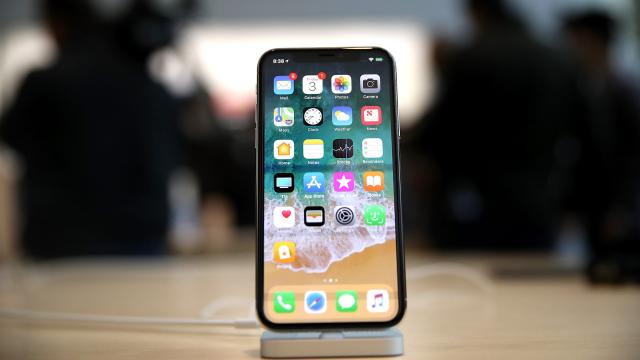Today’s kids are better behaved than ever. They’re having less sex (and more safely when they do), committing less crime, and doing fewer drugs. But research has also started to show they might be unhappier than previous generations of youths. A new study published today in Emotion adds more support to a leading theory on why that’s the case: The rise of social media and smartphones in kids’ hands.
The joy-sucking iPhone X. Photo: Getty
Researchers looked at data from a nationally representative US survey of Year 8, 10 and 12 students conducted regularly since the 1990s, called the Monitoring the Future Study (Year 12 students have been surveyed by the study since 1976). The survey, which primarily keeps tabs on drug-use trends, also asks teens to rate how satisfied they are with their lives and themselves, as well as their happiness. For instance, teens were asked to rate how happy they felt about “things these days” on a scale from one to three, with three representing “very happy”, two meaning “pretty happy”, and one signifying “not too happy”. In total, more than a million US teenagers, ages 13 to 18, were included in the sample.
The researchers, echoing findings elsewhere, found a steady uptick in self-esteem and happiness among teens throughout the 1990s and 2000s. But they also found that since 2012, teens’ overall psychological well-being has noticeably declined. In 2012, for instance, the average happiness rating of Year 10 students hovered around 2.06; by 2016, it had dropped below 2.00. The deceases were relatively modest and never fell below the ratings seen in the dark days of the early 1990s, but they were also abrupt and larger than any other momentary decrease seen in the preceding years.
The year 2012 also happens to be – not coincidentally, the researchers theorise – the first year that a slim majority of Americans reported owning a smartphone, as did over a third of teens. By 2016, over three-quarters of teens said the same.
“Almost all of the drop in teens’ happiness occurred between 2012 and 2015. That’s a very short time period, which makes it easier to identify possible causes,” lead author Jean Twenge, a professor of psychology at San Diego University, tells me over email. “By far the biggest change in teens’ lives between 2012 and 2015 was the ascendance of the smartphone. It’s difficult to think of anything else that changed that suddenly during that time period that could have impacted teens’ well-being as much.”
Twenge has frequently sounded an alarm over the connection between smartphones and teen unhappiness. Last year, she published her book, iGen: Why Today’s Super-Connected Kids Are Growing Up Less Rebellious, More Tolerant, Less Happy – and Completely Unprepared for Adulthood, which discussed the current study’s findings prior to its publication. But the overall research is still something of a mixed bag: Some studies have found a positive link between self-esteem and social media; some have found no clear connection in either direction; and others have speculated that other factors, such as the Great Recession, might better explain the recent teenage melancholy.
To better suss out their theory, Twenge’s team compared different groups of teens to one another, based on their reported time spent daily on “new screen media activities”, such as using smartphones; older screen-based activities, such as watching TV; and non-screen activities such as hanging out with friends. They consistently found that teens, especially Year 8 and 10 students, who spent more time looking at screens were less happy, less satisfied with their lives, and had lower self-esteem. Conversely, the more time teens spent socialising, playing sports and even doing homework, the generally happier they were.
The team also found evidence that teens became unhappier the year after they started spending more time on screens, which further supports (but doesn’t definitively prove, as they admit) a direct cause-and-effect link, while no strong link was found between economic factors such as a lower family income and poorer well-being.
“It would be great if more randomised experiments addressed this question, but those that exist show that giving up social media benefits well-being,” says Twenge, referencing a 2016 study that found volunteers who stopped using Facebook for a week were more satisfied with their lives and had more positive emotions. Smartphones might indirectly affect people’s wellbeing by making them sleep less.
All things considered, Twenge isn’t a Luddite, demanding everyone start destroying their iPhones to save themselves. The current study, similar to a 2017 study in the UK, found that some screen time was better correlated with happiness than no screen time. Instead, she says it’s about moderation.
“Based on the research, it seems best to limit leisure time on electronic devices to 2 hours a day – for all age groups (kids, teens, adults),” she says. That might be a matter of self-discipline for older people, but Twenge has advocated that companies such as Apple implement age-based changes to their products, like restricting the apps accessible, shutting it automatically down at night, and limiting the hours it can be used per day.
In the future, Twenge hopes to examine other variables, like gender, that might influence how smartphones affect happiness.
[Emotion]
